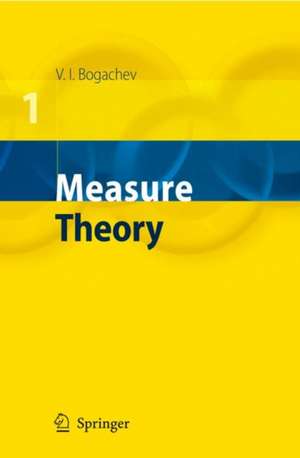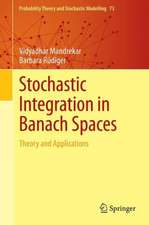Measure Theory
Autor Vladimir I. Bogacheven Limba Engleză Hardback – 3 noi 2006
| Toate formatele și edițiile | Preț | Express |
|---|---|---|
| Paperback (1) | 1010.45 lei 38-44 zile | |
| Springer Berlin, Heidelberg – 23 aug 2016 | 1010.45 lei 38-44 zile | |
| Hardback (1) | 1028.04 lei 38-44 zile | |
| Springer Berlin, Heidelberg – 3 noi 2006 | 1028.04 lei 38-44 zile |
Preț: 1028.04 lei
Preț vechi: 1352.69 lei
-24% Nou
Puncte Express: 1542
Preț estimativ în valută:
196.72€ • 205.91$ • 163.73£
196.72€ • 205.91$ • 163.73£
Carte tipărită la comandă
Livrare economică 26 martie-01 aprilie
Preluare comenzi: 021 569.72.76
Specificații
ISBN-13: 9783540345138
ISBN-10: 3540345132
Pagini: 1112
Ilustrații: XVII, 1075 p. In 2 volumes, not available separately.
Dimensiuni: 155 x 235 x 64 mm
Greutate: 1.98 kg
Ediția:2007
Editura: Springer Berlin, Heidelberg
Colecția Springer
Locul publicării:Berlin, Heidelberg, Germany
ISBN-10: 3540345132
Pagini: 1112
Ilustrații: XVII, 1075 p. In 2 volumes, not available separately.
Dimensiuni: 155 x 235 x 64 mm
Greutate: 1.98 kg
Ediția:2007
Editura: Springer Berlin, Heidelberg
Colecția Springer
Locul publicării:Berlin, Heidelberg, Germany
Public țintă
ResearchDescriere
Measure theory is a classical area of mathematics born more than two thousand years ago. Nowadays it continues intensive development and has fruitful connections with most other fields of mathematics as well as important applications in physics.
This book gives an exposition of the foundations of modern measure theory and offers three levels of presentation: a standard university graduate course, an advanced study containing some complements to the basic course (the material of this level corresponds to a variety of special courses), and, finally, more specialized topics partly covered by more than 850 exercises.
Volume 1 (Chapters 1-5) is devoted to the classical theory of measure and integral. Whereas the first volume presents the ideas that go back mainly to Lebesgue, the second volume (Chapters 6-10) is to a large extent the result of the later development up to the recent years. The central subjects in Volume 2 are: transformations of measures, conditional measures, and weak convergence of measures. These three topics are closely interwoven and form the heart of modern measure theory.
The organization of the book does not require systematic reading from beginning to end; in particular, almost all sections in the supplements are independent of each other and are directly linked only to specific sections of the main part.
The target readership includes graduate students interested in deeper knowledge of measure theory, instructors of courses in measure and integration theory, and researchers in all fields of mathematics. The book may serve as a source for many advanced courses or as a reference.
This book gives an exposition of the foundations of modern measure theory and offers three levels of presentation: a standard university graduate course, an advanced study containing some complements to the basic course (the material of this level corresponds to a variety of special courses), and, finally, more specialized topics partly covered by more than 850 exercises.
Volume 1 (Chapters 1-5) is devoted to the classical theory of measure and integral. Whereas the first volume presents the ideas that go back mainly to Lebesgue, the second volume (Chapters 6-10) is to a large extent the result of the later development up to the recent years. The central subjects in Volume 2 are: transformations of measures, conditional measures, and weak convergence of measures. These three topics are closely interwoven and form the heart of modern measure theory.
The organization of the book does not require systematic reading from beginning to end; in particular, almost all sections in the supplements are independent of each other and are directly linked only to specific sections of the main part.
The target readership includes graduate students interested in deeper knowledge of measure theory, instructors of courses in measure and integration theory, and researchers in all fields of mathematics. The book may serve as a source for many advanced courses or as a reference.
Cuprins
Constructions and extensions of measures.- The Lebesgue integral.- Operations on measures and functions.- The spaces Lp and spaces of measures.- Connections between the integral and derivative.- Borel, Baire and Souslin sets.- Measures on topological spaces.- Weak convergence of measure.- Transformations of measures and isomorphisms.- Conditional measures and conditional.
Recenzii
From the reviews:
"The main thrust of the very detailed account of this subject by Bogachev in two volumes making up approximately 1100 pages, with 2038 references listed, is a scholarly rendering of its many sided view, some highlights of which will be commented on here. … The treatment is reader friendly and I would recommend that each graduate real analysis student own both volumes … and they make a good reference set to keep on ones shelf." (Malempati M. Rao, Zentralblatt MATH, Vol. 1120 (22), 2007)
"Volume one contains the modern foundations of measure and integration theory … . I should mention that the problems are accessible to students—some of the exercises are especially recommended for students … . The monograph excels by its clear, scholarly style and the wealth of … historical comments and references. … For any library and researchers in mathematical analysis or probability theory these … are a must-have—for the mathematical literature this is a wonderful addition." (René L. Schilling, Mathematical Reviews, Issue 2008 g)
"This is a remarkably comprehensive treatise on modern, as well as classical, measure theory and integration. … This is an excellent and impressive monograph, which I can strongly recommended to researchers in analysis and probability, to university teachers as well as to students. I am convinced that this … volume treatise cannot be missing from university libraries and the shelves of mathematicians interested in measure and integration." (EMS Newsletter, December, 2008)
"The main thrust of the very detailed account of this subject by Bogachev in two volumes making up approximately 1100 pages, with 2038 references listed, is a scholarly rendering of its many sided view, some highlights of which will be commented on here. … The treatment is reader friendly and I would recommend that each graduate real analysis student own both volumes … and they make a good reference set to keep on ones shelf." (Malempati M. Rao, Zentralblatt MATH, Vol. 1120 (22), 2007)
"Volume one contains the modern foundations of measure and integration theory … . I should mention that the problems are accessible to students—some of the exercises are especially recommended for students … . The monograph excels by its clear, scholarly style and the wealth of … historical comments and references. … For any library and researchers in mathematical analysis or probability theory these … are a must-have—for the mathematical literature this is a wonderful addition." (René L. Schilling, Mathematical Reviews, Issue 2008 g)
"This is a remarkably comprehensive treatise on modern, as well as classical, measure theory and integration. … This is an excellent and impressive monograph, which I can strongly recommended to researchers in analysis and probability, to university teachers as well as to students. I am convinced that this … volume treatise cannot be missing from university libraries and the shelves of mathematicians interested in measure and integration." (EMS Newsletter, December, 2008)
Notă biografică
Vladimir Bogachev was born in Moscow in 1961. He got the PhD at Moscow State University in 1986 and he got the degree of Doctor of Sciences in 1990. Since 1986 Vladimir Bogachev has worked at the Department of Mechanics and Mathematics of Moscow State University. The main fields of his research are measure theory, nonlinear functional analysis, probability theory, and stochastic analysis. He is a well-nown expert in measure theory, probability theory, and the Malliavin calculus, and the author of more than 100 scientific publications. His monograph ``Gaussian Measures’’ (AMS, 1998) has become a widely used source. Vladimir Bogachev hs been an invited speaker and a lecturer at many international conferences and several dozen universities and mathematical institutes over the world.
Scientific awards: a medal of the Academy of Sciences of the USSR and the Award of the Japan Society of Promotion of Science.
Scientific awards: a medal of the Academy of Sciences of the USSR and the Award of the Japan Society of Promotion of Science.
Textul de pe ultima copertă
Measure theory is a classical area of mathematics that continues intensive development and has fruitful connections with most other fields of mathematics as well as important applications in physics.
This book gives a systematic presentation of modern measure theory as it has developed over the past century and offers three levels of presentation: a standard university graduate course, an advanced study containing some complements to the basic course (the material of this level corresponds to a variety of special courses), and, finally, more specialized topics partly covered by more than 850 exercises. Bibliographical and historical comments and an extensive bibliography with 2000 works covering more than a century are provided.
Volume 1 is devoted to the classical theory of measure and integral. Whereas the first volume presents the ideas that go back mainly to Lebesgue, the second volume is to a large extent the result of the later development up to the recent years. The central subjects of Volume 2 are: transformations of measures, conditional measures, and weak convergence of measures. These topics are closely interwoven and form the heart of modern measure theory.
The target readership includes graduate students interested in deeper knowledge of measure theory, instructors of courses in measure and integration theory, and researchers in all fields of mathematics. The book may serve as a source for many advanced courses or as a reference.
This book gives a systematic presentation of modern measure theory as it has developed over the past century and offers three levels of presentation: a standard university graduate course, an advanced study containing some complements to the basic course (the material of this level corresponds to a variety of special courses), and, finally, more specialized topics partly covered by more than 850 exercises. Bibliographical and historical comments and an extensive bibliography with 2000 works covering more than a century are provided.
Volume 1 is devoted to the classical theory of measure and integral. Whereas the first volume presents the ideas that go back mainly to Lebesgue, the second volume is to a large extent the result of the later development up to the recent years. The central subjects of Volume 2 are: transformations of measures, conditional measures, and weak convergence of measures. These topics are closely interwoven and form the heart of modern measure theory.
The target readership includes graduate students interested in deeper knowledge of measure theory, instructors of courses in measure and integration theory, and researchers in all fields of mathematics. The book may serve as a source for many advanced courses or as a reference.
Caracteristici
Gives a systematic presentation of modern measure theory as it has developed over the past century
Includes material for a standard graduate class, advanced material not covered by the standard course but necessary in order to read research literature in the area, and extensive additional information on the most diverse aspects of measure theory and its connections with other fields
Over 850 exercises with detailed hints and references are given
Bibliographical comments and an extensive bibliography with 2000 works covering more than a century are provided
Includes supplementary material: sn.pub/extras
Includes material for a standard graduate class, advanced material not covered by the standard course but necessary in order to read research literature in the area, and extensive additional information on the most diverse aspects of measure theory and its connections with other fields
Over 850 exercises with detailed hints and references are given
Bibliographical comments and an extensive bibliography with 2000 works covering more than a century are provided
Includes supplementary material: sn.pub/extras









